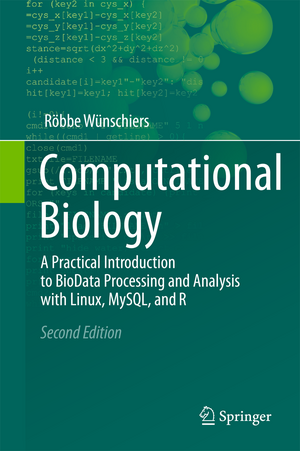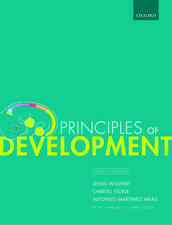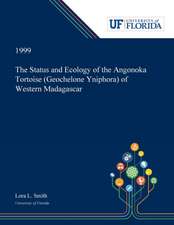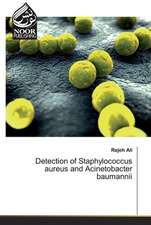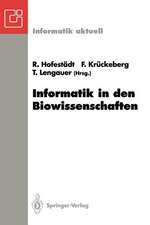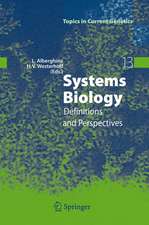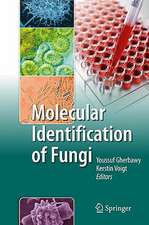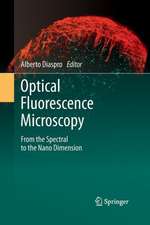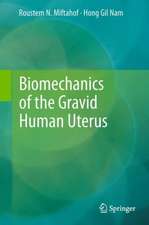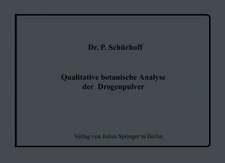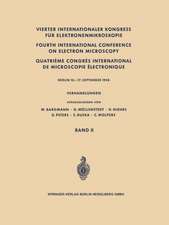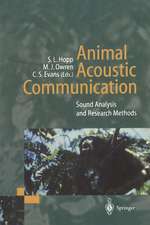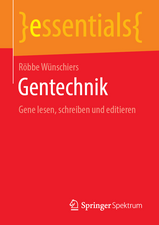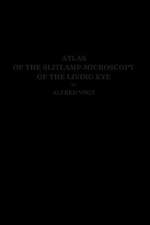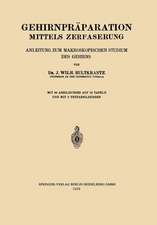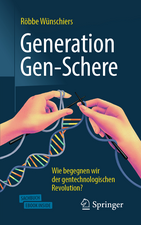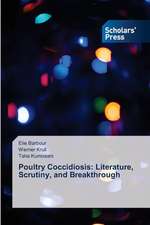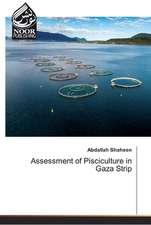Computational Biology: A Practical Introduction to BioData Processing and Analysis with Linux, MySQL, and R
Autor Röbbe Wünschiersen Limba Engleză Hardback – 31 ian 2013
- data processing with Linux tools and the programming languages AWK and Perl
- data management with the relational database system MySQL, and
- data analysis and visualization with the statistical computing environment R
for students and practitioners in the life sciences. Although written for beginners, experienced researchers in areas involving bioinformatics and computational biology may benefit from numerous tips and tricks that help to process, filter and format large datasets. Learning by doing is the basic concept of this book. Worked examples illustrate how to employ data processing and analysis techniques, e.g. for
- finding proteins potentially causing pathogenicity in bacteria,
- supporting the significance of BLAST with homology modeling, or
- detecting candidate proteins that may be redox-regulated, on the basis of their structure.
All the softwaretools and datasets used are freely available. One section is devoted to explaining setup and maintenance of Linux as an operating system independent virtual machine. The author's experiences and knowledge gained from working and teaching in both academia and industry constitute the foundation for this practical approach.
| Toate formatele și edițiile | Preț | Express |
|---|---|---|
| Paperback (1) | 536.49 lei 6-8 săpt. | |
| Springer Berlin, Heidelberg – 26 iun 2015 | 536.49 lei 6-8 săpt. | |
| Hardback (1) | 599.82 lei 38-45 zile | |
| Springer Berlin, Heidelberg – 31 ian 2013 | 599.82 lei 38-45 zile |
Preț: 599.82 lei
Preț vechi: 779.00 lei
-23% Nou
Puncte Express: 900
Preț estimativ în valută:
114.77€ • 119.83$ • 94.99£
114.77€ • 119.83$ • 94.99£
Carte tipărită la comandă
Livrare economică 31 martie-07 aprilie
Preluare comenzi: 021 569.72.76
Specificații
ISBN-13: 9783642347481
ISBN-10: 3642347487
Pagini: 493
Ilustrații: XXIX, 449 p. 78 illus., 66 illus. in color.
Dimensiuni: 155 x 235 x 35 mm
Greutate: 0.82 kg
Ediția:2nd ed. 2013
Editura: Springer Berlin, Heidelberg
Colecția Springer
Locul publicării:Berlin, Heidelberg, Germany
ISBN-10: 3642347487
Pagini: 493
Ilustrații: XXIX, 449 p. 78 illus., 66 illus. in color.
Dimensiuni: 155 x 235 x 35 mm
Greutate: 0.82 kg
Ediția:2nd ed. 2013
Editura: Springer Berlin, Heidelberg
Colecția Springer
Locul publicării:Berlin, Heidelberg, Germany
Public țintă
Professional/practitionerCuprins
Part I Whetting Your Appetite.- 1 Introduction.- 2 Content of this Book.- Part II Computer & Operating Systems.- 3 Unix/Linux.- Part III Working with Linux.- 4 The First Touch.- 5 Working with Files.- 6 Remote Connections.- 7 Playing.- 8 Using the Shell.- 9 Installing BLAST+ and ClustalW.- 10 Shell Programming.- 11 Regular Expressions.- 12 Sed.- Part IV Programming.- 13 AWK.- 14 Perl.- 15 Other Programming Languages.- Part V Advanced Data Analysis.- 16 Relational Databases with MySQL.- 17 The Statistics Suite R.- Part VI Worked Examples.- 18 Genomic Analysis of the Pathogenicity Factors from E. coli Strain O157:H7 and EHEC Strain O104:H4.- 19 Limits of BLAST & Homology Modeling.- 20 Virtual Sequencing of pUC18c.- 21 Querying for Potential Redox-Regulated Enzymes.- Part VII Additional Material.- References.- A Supplementary Information.- Solutions.- Index.
Notă biografică
Röbbe Wünschiers is Professor for Biochemistry/Molecular Biology at University of Applied Sciences Mittweida/Germany, where is teaching courses on biotechnology and bioinformatics. In 2004 he published the textbook “Computational Biology - Unix/Linux, Data Processing and Programming” with Springer. The new edition of this book will benefit from several years of teaching experience at different Universities, and his experience gathered while leading a bioinformatics team at BASF Plant Science, Germany.
Textul de pe ultima copertă
This greatly expanded 2nd edition provides a practical introduction to
- data processing with Linux tools and the programming languages AWK and Perl
- data management with the relational database system MySQL, and
- data analysis and visualization with the statistical computing environment R
for students and practitioners in the life sciences. Although written for beginners, experienced researchers in areas involving bioinformatics and computational biology may benefit from numerous tips and tricks that help to process, filter and format large datasets. Learning by doing is the basic concept of this book. Worked examples illustrate how to employ data processing and analysis techniques, e.g. for
- finding proteins potentially causing pathogenicity in bacteria,
- supporting the significance of BLAST with homology modeling, or
- detecting candidate proteins that may be redox-regulated, on the basis of their structure.
All the softwaretools and datasets used are freely available. One section is devoted to explaining setup and maintenance of Linux as an operating system independent virtual machine. The author's experiences and knowledge gained from working and teaching in both academia and industry constitute the foundation for this practical approach.
- data processing with Linux tools and the programming languages AWK and Perl
- data management with the relational database system MySQL, and
- data analysis and visualization with the statistical computing environment R
for students and practitioners in the life sciences. Although written for beginners, experienced researchers in areas involving bioinformatics and computational biology may benefit from numerous tips and tricks that help to process, filter and format large datasets. Learning by doing is the basic concept of this book. Worked examples illustrate how to employ data processing and analysis techniques, e.g. for
- finding proteins potentially causing pathogenicity in bacteria,
- supporting the significance of BLAST with homology modeling, or
- detecting candidate proteins that may be redox-regulated, on the basis of their structure.
All the softwaretools and datasets used are freely available. One section is devoted to explaining setup and maintenance of Linux as an operating system independent virtual machine. The author's experiences and knowledge gained from working and teaching in both academia and industry constitute the foundation for this practical approach.
Caracteristici
Updated and expanded new edition New, practical exercises suitable both for courses and self-teaching Written by an experienced lecturer and researcher Case studies, exercises with solutions and worked-out examples are included to demonstrate and practice Not only beginners, but also more experienced bioinformaticists will be able to gather new insights Shows how to efficiently extract, organize and visualize information from large datasets Includes supplementary material: sn.pub/extras
